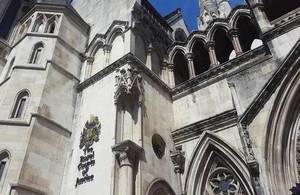Juror convicted for internet research
Juror jailed for researching the case she was on and telling the rest of the jury information they did not know.

The Divisional Court, headed by the Lord Chief Justice, has found a juror whose internet research caused a trial to collapse guilty of common law contempt, following a case brought by the Attorney General, Dominic Grieve QC MP.
Theodora Dallas was a juror in a case at Luton Crown Court in July, 2011. The High Court heard that she disobeyed several orders not to conduct research on the internet and then told her fellow jurors about a previous charge against the defendant which they had been unaware of. The case she was trying was discharged and a retrial ordered.
Mr Grieve said:
I take no pleasure in bringing such cases but they send an important message. By her action Ms Dallas halted a trial which was near completion and aside from the financial implications, her actions resulted in the victim in the case being forced to return to court and give evidence for a second time.
There can be little doubt that repeated warnings were given to Ms Dallas and her fellow jurors as to the prohibition on conducting research into the case which they were trying. Only 3 weeks earlier the Solicitor General prosecuted juror Joanne Fraill for discussing a trial on Facebook; a case mentioned by the Judge in his directions to the jury.
Before the trial started the potential jurors had been given verbal instructions from the court’s Jury Officer not to research their cases on the internet, or any of the individuals involved in the trial. Notice boards in the jury waiting room gave similar warnings and the trial judge also reminded them of the Fraill case.
The trial related to Barry Medlock, charged with 2 co-defendants with causing grievous bodily harm with intent, contrary to section 18 of the Offences Against the Person Act 1861. The allegation was that over an extended period of time he and the co-defendants tortured the victim, beat him with various objects, set him alight and poured caustic soda with boiling water over him. The victim was scarred for life.
The 2 co-defendants pleaded guilty, and Medlock was tried alone, starting on 4 July 2011. Details of a previous conviction for Actual Bodily Harm were allowed to be adduced in evidence under Bad Character provisions. However, on the third day of the trial another juror reported that Ms Dallas had been on the internet, found that the defendant and his accomplice had also been previously charged with rape (Medlock was acquitted), and had told the other jurors, despite being asked to stop.
Ms Dallas denied that she had deliberately conducted research and had understood the directions only related to Facebook. The Attorney submitted that she, deliberately and in breach of instructions given by the jury officer, a warning contained in a written notice, her jury oath or affirmation and directions given by the trial judge, (a) conducted internet research on the case she was trying, and thereby obtained extraneous information about the case, and (b) imparted that extraneous information to other members of the jury whilst the jury were in deliberation.